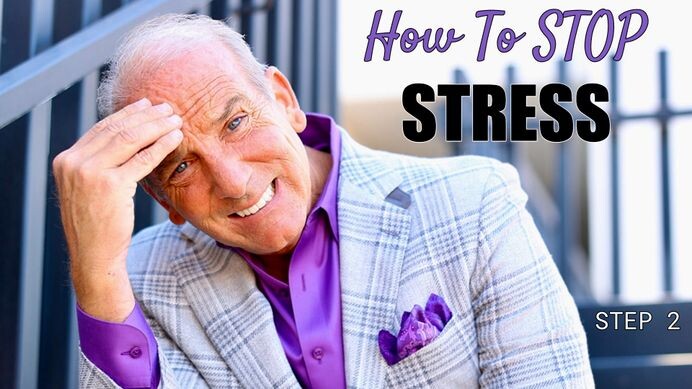As you may recall, during Part 1 of this special 5-part series top stop stress, we discovered that both the media and the medical community are misleading us about what stress is. Stress is an emotional condition. Therefore, whenever we experience “stress,” we are experiencing fear we should stop stress.
The next aspect they will not tell you is that fear is always one of these three things: Fear of rejection, inadequacy, or powerlessness. Rest In Peace (R.I.P.) is the acronym to remember. That way, whenever you’re stressed or afraid, you can ask yourself, “Do I fear Rejection, Inadequacy, or Powerlessness?”
Today, we will tackle the fear of rejection and what to do when you feel this emotion. To do that, we will focus on three things.
1.) What causes the fear of rejection.
2.) The seven signs of low self-esteem – (Now, please stay open-minded. If you are uncomfortable with the phrase low self-esteem, then perhaps self-confidence may resonate better with some of you.) No one wants to have low self-esteem. So don’t be hard on yourself. That’s why we’re learning about the fear of rejection.
3.) The solutions to move out of the fear of rejection and deal with this form of stress and should stop stress.
So, let’s talk about what causes the fear of rejection? It comes from looking outside of ourselves for validation. You see, the truth is, no one ever rejects us, ever! It’s not possible! People are just acting on what they believe to be in their best interest. Think about it. If you have ever been dumped, what did they complain about oct reason did they give? They might have said they wanted to have more intimacy or wanted to go on more vacations, or wanted somebody who had this skill or that skill? That’s not a rejection of us; that’s them pursuing their own needs and wants.
So then, why do we feel they are rejecting us? To survive as a species, we must attach to another human being physically and emotionally. The overwhelming responsibility of being a parent means that each parent will experience perfectly imperfect moments when they aren’t available to substantiate us. In those moments, we experienced abandonment. The only solution we had as a child to reconcile that pain was to blame ourselves.
You see, if I blame myself, that means I might be able to fix it, right? It gives me hope that my perfectly imperfect parents will not abandon me if I change. Now, as adults, the thought that “If I’m rejected, I can change or fix it and make you like me” may feel like we have power, but it is false power. It really means we gave away our power to the other person. We just placed their wants and needs above ours, and by pursuing being someone different, we are looking outside of ourselves to validate our worth. Well, the only person that can ever validate us is ourselves. Therefore, by deciding something is wrong with us and blaming ourselves, we are enacting a self-sabotaging process to get power over our childhood pain of abandonment.
Now that we understand how we created our rejection let’s look at how it expresses itself in low self-esteem.
Seven Signs of low self-esteem:
1.) Self-criticism – When a simple mistake is made, a person’s self-talk is highly negative and critical.
2.) Chaotic relationships – due to the unhealed abandonment wound, they experience frequent chaos in relationships.
3.) Defensiveness – The primary instinctual response to feedback or differing opinions becomes defensive.
4.) Chronic Indecision – Not wanting to decide for fear of being wrong. To be “wrong” would trigger the unhealed childhood abandonment.
5.) Perfectionism – The need to be perfect places our value outside ourselves onto someone else. In addition, since perfection is unattainable, we have rejected ourselves before the other person has a chance. The act of self-rejection places us in power.
6.) Feeling anxious, fearful, or angry – Experiencing these feelings in moments is healthy. However, a red flag is getting stuck in them with the inability to process or move through them with moderation.
7.) Poor Communication Skills – This looks like not telling our partner or friends precisely what we need, think, and feel. We also tend to be unable to say “No.” We give ourselves away. We give into things because we fear the loss of the relationship. Again, that’s the need for external validation.
To regain our self-esteem, we have to recognize how we were intentionally or unintentionally abandoned by our perfectly imperfect parents and accept that we are looking outside ourselves for that validation as adults.
To begin developing that validation from within, I suggest doing affirmations. There are two crucial keys to affirmations that some people are unaware of. The first key involves how we write down our affirmations. We don’t want to write, “I want to,” or “I will.” That puts the acknowledgment in the future, which means we will never attain it. Instead, we want to begin the affirmation with, “I have” or “I am.” We have to declare it as truth. We can’t lie to ourselves for those areas we want to gain acceptance of. For instance, if in our view we are overweight, we can’t declare,” I’m skinny.” Instead, we would want to say, “I am willing to be thin.” See the difference?
The second key to using affirmations that many are unaware of is the need to feel them. Because we were abandoned as a child, that feeling is still strong within us. So, we have to replace that negative feeling and soak up the positive feeling of the affirmation.
The second step is to list your accomplishments throughout the day. Because of perfectionism and the inability to make our own choices, we end our day rejecting ourselves by focusing on the minor things we didn’t finish. So, we list our accomplishments at the end of the day to realize how much we have accomplished. I have a client who does this, and she takes it one step further. Throughout her day, she lists everything she does. Simple things like she took a shower. She mopped the floor she answered 15 emails. Every little thing, she affirms herself and no longer rejects herself. She doesn’t expect perfectionism anymore. She can see that she is doing a lot throughout her day.
The third step is self-care. When we fear rejection, we want someone or something to fill the hole inside of ourselves. It is our job to fill that need. Therefore we want to list all the things that bring us joy and do not require others to do for us. Then, the next time that feeling comes up, we want to look at our list and take action on meeting our needs and wants.
You now have the process to overcome the fear of rejection. Coming up next in Part III to stop stress, we will tackle conquering the fear of inadequacy. Here is part 3 to stop stress.
Learn more here:




